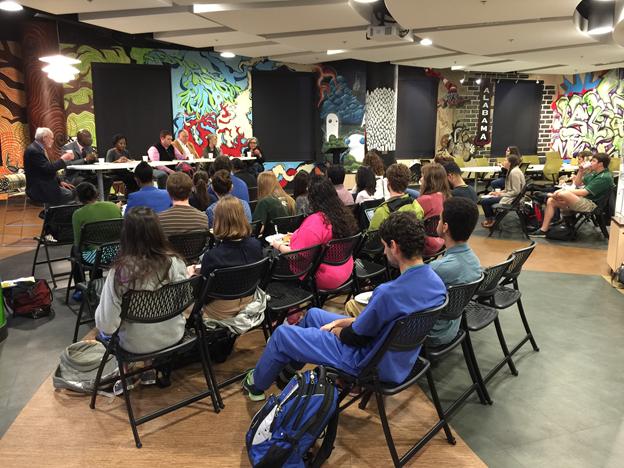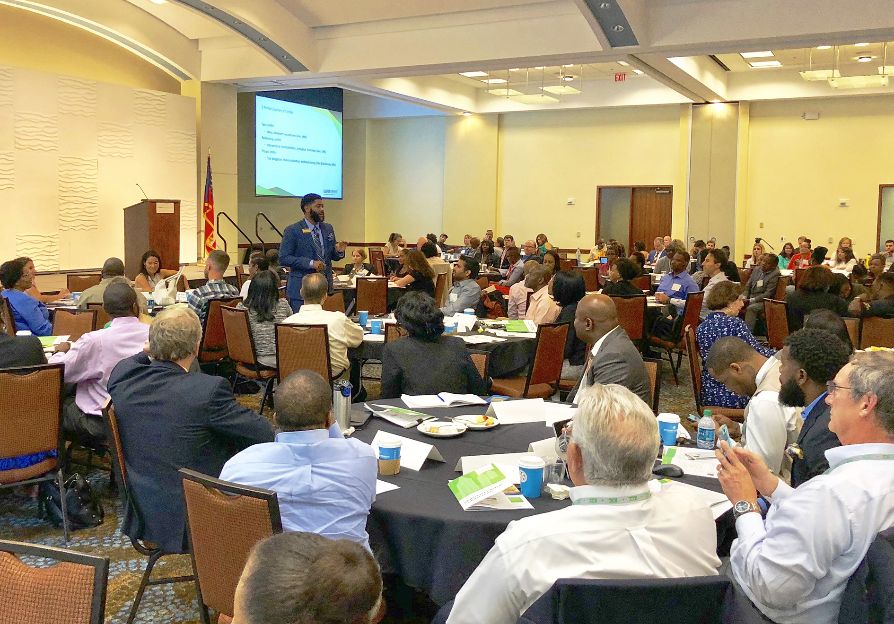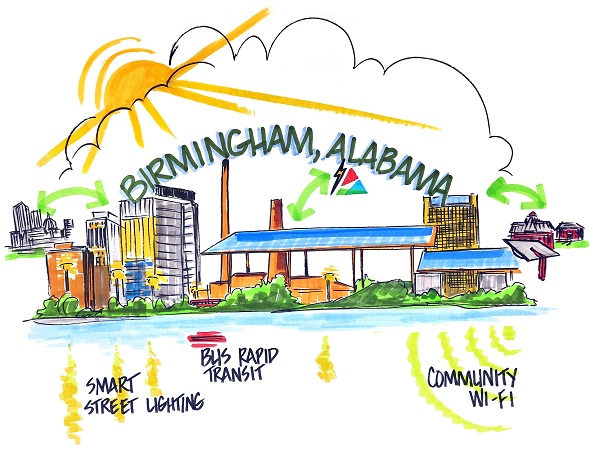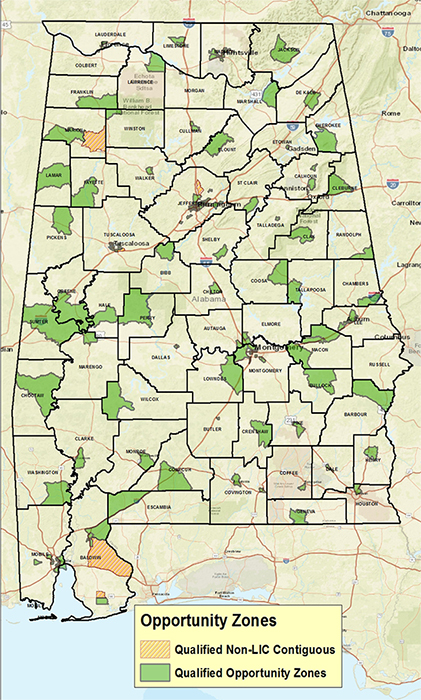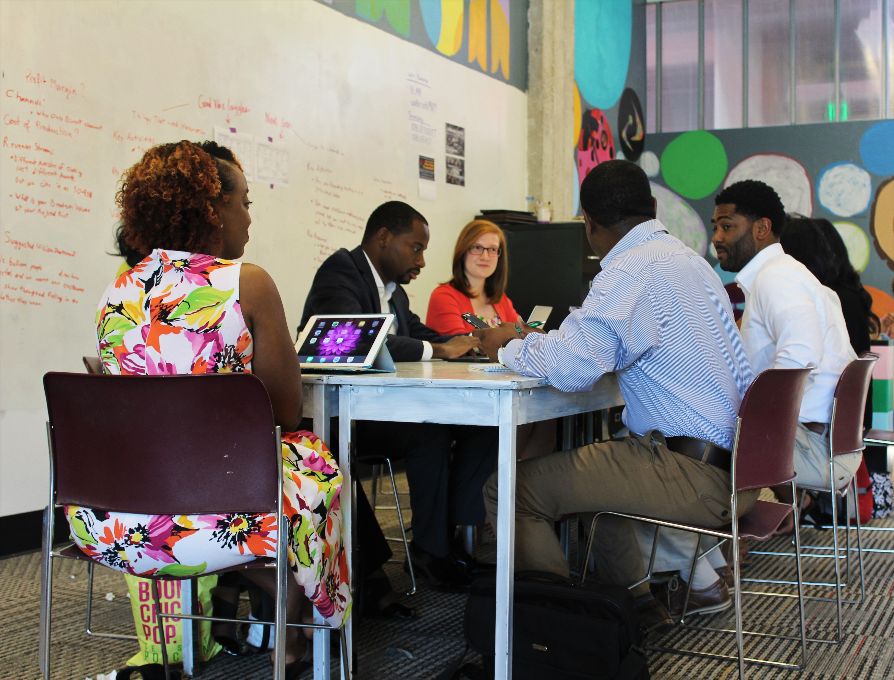There are easy problems and then there are “wicked” problems: those highly complex problems whose potential solutions require creative, interdisciplinary thinking. Students and faculty from the Collat School of Business recently participated in a “Wicked Problem Case Competition” sponsored by the UAB School of Public Health. A total of 13 teams of UAB’s best thinkers competed. This year’s problem was how to revitalize the Bush Hills neighborhood of Birmingham located about four miles northwest of the UAB campus.
This year’s competition began on Monday March 9, 2015 with a kickoff luncheon at Sardis Baptist Church, a historic church in the Bush Hills community. “Rather than launching the competition on campus, we thought it would be important to bring the students into the community—and we were right,” said Dr. Anthony C. Hood, Assistant Professor of Management in the Collat School of Business and member of the planning committee for this year’s case competition. The committee chartered 2 UAB Blazer Express buses to provide students a tour of the Bush Hills neighborhood and transportation to and from the church.

To gain a better understanding of the challenges and opportunities associated with urban revitalization and gentrification, many student teams came back to the neighborhood and conducted interviews with local residents.

To provide students with additional context for their solutions, a panel of local experts was convened on Friday morning, March 13, 2015 in the UAB Edge of Chaos. The panel consisted of:
- Dr. Max Michael, Dean of the School of Public Health;
- Damian Gilbert, District Manager, Wells Fargo Home Mortgage;
- Melody Echols, Executive Director, Norwood Resource Center;
- Brandon Bias, City of Birmingham Department of Economic and Community Development
- Charlie Waldrep, Attorney, Waldrep, Stewart and Kendrick;
- Sally Mackin, Executive Director, Woodlawn Foundation;
- Cheryl Morgan, Director (Retired), Auburn Urban Design Studio.
After working all day and night in a “hackathon” fashion, the 13 student teams reconvened on Saturday morning March 14, 2015 in the Ryals School of Public Health for the first round of presentations. The teams were separated into 4 tracks. One overall winner was selected from each track to progress to the final round of presentations.
Senior Finance major and Collat School of Business Honors Program student Amanda Viikinsalo was a member of one of the four finalist teams, calling itself “The Burning Bush.” Other members of the team came from the College of Arts and Sciences, the School of Engineering, and the School of Health Professions, demonstrating the interdisciplinary goal of the competition. Viikinsalo is also a student in UAB’s highly selective University Honors Program.

The UAB Entrepreneurship-Club also sponsored a team in the competition. That team consisted of four students from the Collat School of Business: MBA students Nikita Alexandrov, Maria Garcia-Espinosa, and Katerina Soshnikova; and sophomore Industrial Distribution major Zach Plunket; and one student from the College of Arts and Sciences, Biology major Paige Farley. The Entrepreneurship Club, also known as the E-Club, offers a unique opportunity for both undergraduate and graduate students from across UAB to collaborate on innovative ideas. The E-Club operates from the Collat School of Business Innovation Lab at Innovation Depot, and is advised by marketing professor Dr. Doug Ayers.

Dr. Hood served on the planning committee for this year’s Wicked Problem competition, and served as a mentor to two of the teams that participated. Dr. Hood and his wife Robin live in the Bush Hills neighborhood. In 2014, Dr. and Mrs. Hood were the winners of a Community Health Innovation Award from the UAB Center for Clinical and Translational Science for their own project, Nhabit Bush Hills. NHabit is a community-based startup aimed at improving health and well-being of community members through the development of a database of empty and abandoned properties and their conditions in the neighborhood.

Dr. Hood and his wife Robin live in the Bush Hills neighborhood. In 2014, they were winners of a Community Health Innovation Award of the UAB Center for Clinical and Translational Science for NHabit, a social entrepreneurial startup aimed at improving the health of the community by addressing the problem of vacant and abandoned property. Specifically, they are applying the principles of strategy and entrepreneurship to create model for monitoring blight, occupancy and other conditions indicative of community health that can be replicated and scaled to the other 98 neighborhoods in Birmingham. The project was recently highlighted in a UAB Magazine article entitled Building on an Idea and was acknowledged as a key contributor to UAB being placed on the Honor Roll of the President of the United States.

